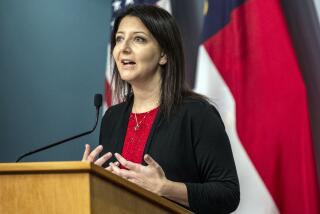Don’t Sell Yourself Short, Author Tells Schoolgirls
- Share via
As a child, Judith Love Cohen was fascinated by the moon.
“To me it wasn’t a piece of cheese or anything like that,” said Cohen, who writes children’s books. “My father would talk to me about the moon, and to me it was mysterious and poetic, like a large, beautiful, honey-colored pearl.”
Her father also played numbers games with his daughter--games that turned out to be basic algebra and geometry problems. The play led to a lifelong affection for numbers, and ultimately Cohen combined her interests, working as an engineer at TRW during the Apollo missions.
And two years ago Cohen wrote “You Can Be a Woman Engineer,” a book for girls that describes the types of engineering--mechanical, electrical and chemical--and how she chose to become an engineer herself.
Since then, Cohen, 61, has written--with other female professionals--six books encouraging girls to enter fields traditionally dominated by men. The books, geared toward third- to sixth-graders, were first available primarily in museum bookstores. Now they are in mainstream stores such as Bookstar and have been purchased by school districts and educational organizations.
The Los Angeles Unified School District bought about 1,000 books, which sell for $6 each. About 18,000 have been sold, Cohen said.
The stories, written on pink, purple, orange and yellow paper, are illustrated by Cohen’s husband, Davis Katz. In addition to the story of Cohen’s career in engineering, the book series tells stories about women working in architecture, marine biology, paleontology, zoology and Egyptology.
The idea for the book series came from a monthly column that Cohen wrote for Engineer of California magazine while she was working for TRW. In 1990 she wrote a piece about her life as an engineer, and Katz, a Los Angeles teacher, encouraged her to write her story specifically for little girls.
“I really don’t think boys are naturally better at math and science than girls,” Cohen said. “But I think what happens is that (girls) who are good at it don’t feel motivated to go on.”
Cohen does not have horror stories of discrimination as she pursued a degree in electrical engineering first at Brooklyn College and then at USC, where she earned a degree in 1957. Instead, from adolescence onward she occasionally met with lukewarm encouragement.
“When I was in fifth grade, there were many girls who were good at math, but when I was in junior high school, I was taking intermediate algebra and I looked around the class and realized I was the only girl.
“One thing that did happen to me, though--in high school, there was a club to help prepare people for scholarships and they wouldn’t let girls take the class,” Cohen said. “But I studied for it, and that year I was the only one from the high school who got the scholarship. That was my vindication.”
Later, Cohen worked on one of the first satellites, a story recounted in the opening of “You Can Be a Woman Engineer.”
“BLAST OFF! The rocket ship was blasting to the moon. My heart was pounding. I was sitting in the control room, calculating math equations and watching this rocket go. Soon, the satellite would be in space.”
The high point of Cohen’s career, however, was working on the backup guidance systems for Apollo missions 11 through 17.
The backup was used on the Apollo 13 mission when the primary system malfunctioned and the astronauts relied on it to return to Earth.
More recently, Cohen worked on an information relay system for the Hubble space telescope.
Cohen, who retired from TRW in 1990, is now a consulting engineer for companies such as Litton Data Systems in the San Fernando Valley and Logicom in San Pedro. She writes and gives readings at bookstores throughout the county at least once a week.
More to Read
Sign up for our Book Club newsletter
Get the latest news, events and more from the Los Angeles Times Book Club, and help us get L.A. reading and talking.
You may occasionally receive promotional content from the Los Angeles Times.






